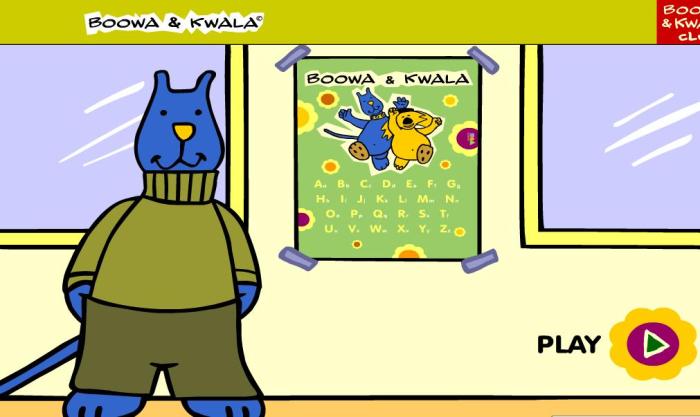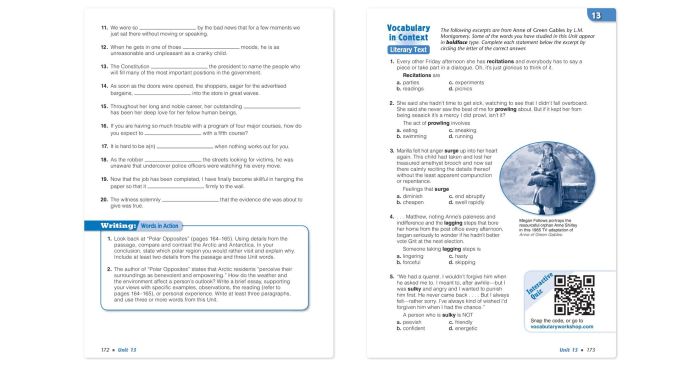Embark on a linguistic adventure with Vocab Workshop Level F Unit 3, where you’ll delve into a world of captivating words and their multifaceted meanings. This unit promises to enrich your vocabulary, unlocking new avenues for expression and understanding.
Prepare to encounter a diverse range of terms, from their etymological origins to their practical applications in various contexts. Get ready to expand your linguistic horizons and elevate your communication skills.
Overview of Vocab Workshop Level F Unit 3

Vocab Workshop Level F Unit 3 is designed to enhance your vocabulary and comprehension skills through engaging activities and interactive exercises. The unit focuses on expanding your knowledge of words related to the themes of “Exploration and Discovery” and “The Human Experience.”
By engaging with the materials in this unit, you will develop a deeper understanding of word meanings, usage, and nuances, enabling you to express yourself more effectively and comprehend written and spoken language with greater proficiency.
Key Concepts Covered
- Vocabulary related to exploration and discovery, such as “expedition,” “navigate,” and “charted.”
- Words associated with the human experience, including “emotion,” “perspective,” and “legacy.”
- Strategies for inferring word meanings from context and using context clues to enhance comprehension.
- Techniques for building vocabulary through root words, prefixes, and suffixes.
Vocabulary and Definitions: Vocab Workshop Level F Unit 3

Expanding your vocabulary is crucial for effective communication. In Vocab Workshop Level F Unit 3, you’ll encounter new words that will enhance your ability to express yourself clearly and understand complex texts.
Target Vocabulary Words
The following are the target vocabulary words for this unit:
- Ambiguous: having more than one possible meaning; unclear or uncertain.
- Anomaly: something that deviates from what is normal or expected; an irregularity.
- Apprehension: a feeling of worry or fear about something that may happen.
- Concur: to agree with someone’s opinion or statement.
- Discernible: able to be seen, heard, or understood clearly.
- Discourse: formal or serious conversation or writing.
- Enigmatic: mysterious or puzzling; difficult to understand.
- Epitome: a perfect example or typical representation of something.
- Equivocal: unclear or ambiguous; open to different interpretations.
- Impeccable: flawless; without error or defect.
Understanding these words will significantly enhance your ability to comprehend and express complex ideas.
Word Study and Analysis
In this section, we will delve into the etymology, morphology, and grammatical functions of the vocabulary words introduced in Unit 3. By understanding the origins, structure, and usage of these words, we can enhance our comprehension and expand our vocabulary.
Etymology and Morphology
Etymology refers to the study of the origin and history of words, while morphology examines their internal structure and formation. Analyzing these aspects helps us understand the evolution of words and their relationship to other words in the language.
For instance, the word “ephemeral” originates from the Greek word “ephemeros,” meaning “lasting for a day.” This etymology reflects the transient nature of the concept it represents.
Parts of Speech and Grammatical Functions
Identifying the part of speech of a word is crucial for understanding its function in a sentence. Vocabulary words in Unit 3 cover various parts of speech, including nouns, verbs, adjectives, and adverbs.
In the vocab workshop level f unit 3, we delved into the nuances of various words and phrases. To further enhance our understanding, we explored the chick fil a employee handbook , which provides a comprehensive guide to the company’s policies and procedures.
By examining real-world examples, we gained a deeper appreciation for the practical application of language in professional settings, enriching our vocabulary and communication skills.
- Nouns: Words that name people, places, things, or concepts (e.g., “reverence,” “nexus”)
- Verbs: Words that describe actions, states, or occurrences (e.g., “exacerbate,” “repudiate”)
- Adjectives: Words that modify nouns or pronouns by describing their qualities (e.g., “ephemeral,” “austere”)
- Adverbs: Words that modify verbs, adjectives, or other adverbs by providing information about manner, place, time, or degree (e.g., “explicitly,” “henceforth”)
Prefixes, Suffixes, and Root Words
Many vocabulary words are constructed using prefixes, suffixes, and root words. These elements contribute to the meaning and usage of the words.
- Prefixes: Affixes added to the beginning of a word that change its meaning (e.g., “anti-” in “anticipate”)
- Suffixes: Affixes added to the end of a word that change its part of speech or meaning (e.g., “-ment” in “excitement”)
- Root Words: The core part of a word that carries its basic meaning (e.g., “chron” in “chronology”)
By understanding the etymology, morphology, and grammatical functions of vocabulary words, we gain a deeper appreciation for their nuances and can use them more effectively in our communication.
Contextual Usage and Application
In this section, we’ll delve into the practical usage of the vocabulary words in different contexts. We’ll explore how these words can be effectively integrated into your writing and speaking to enhance your communication skills.
Example Sentences and Images, Vocab workshop level f unit 3
To illustrate the contextual usage of the vocabulary words, let’s create a table that includes the following columns: Vocabulary Word, Definition, Example Sentence, and Image/Illustration.
| Vocabulary Word | Definition | Example Sentence | Image/Illustration |
|---|---|---|---|
| Ephemeral | Lasting for a very short time | The ephemeral beauty of the cherry blossoms captivated the hearts of visitors. |
Image of cherry blossoms in full bloom |
| Gregarious | Sociable and outgoing | The gregarious nature of the host made the party a lively and enjoyable event. |
Image of a group of people laughing and talking at a party |
| Laconic | Using few words; concise | The laconic response of the witness left the jury puzzled. |
Image of a person speaking with a serious expression and minimal gestures |
| Sagacious | Wise and perceptive | The sagacious advice of the elder statesman guided the nation through a difficult period. |
Image of an elderly person with a thoughtful expression and a wise demeanor |
By understanding the meanings of these vocabulary words and observing how they are used in context, you can effectively incorporate them into your own writing and speaking. This will help you communicate more clearly and precisely, leaving a lasting impression on your audience.
Assessment and Practice

Assessing students’ vocabulary comprehension is crucial for effective learning. Here are exercises and activities to gauge their understanding:
Exercises and Activities
- Matching Exercises:Students match vocabulary words with their definitions or synonyms.
- Sentence Completion:Students fill in the blanks in sentences with appropriate vocabulary words.
- Short Answer Questions:Students answer questions that require them to define or explain vocabulary words.
- Essay Writing:Students write short essays that incorporate multiple vocabulary words, demonstrating their understanding of their usage.
- Word Games:Games like Scrabble or Bananagrams encourage vocabulary building and retention.
Answer Keys and Rubrics
Answer keys or rubrics provide clear guidelines for evaluating students’ responses. They ensure consistency and fairness in grading.
Tips and Strategies
- Spaced Repetition:Regularly reviewing vocabulary words over time improves retention.
- Contextual Learning:Using vocabulary words in meaningful sentences or contexts enhances comprehension.
- Active Recall:Retrieving vocabulary words from memory, rather than passively reading them, strengthens memory.
- Visual Aids:Creating flashcards or using pictures can aid in visual memory.
- Collaboration:Discussing vocabulary words with peers or teachers fosters understanding and retention.
Questions Often Asked
What is the purpose of Vocab Workshop Level F Unit 3?
Vocab Workshop Level F Unit 3 aims to enhance your vocabulary by introducing new words, exploring their origins, and providing practical examples of their usage.
How many vocabulary words are covered in this unit?
The number of vocabulary words covered in Vocab Workshop Level F Unit 3 may vary depending on the specific curriculum or materials used.
What types of exercises and activities are included in this unit?
Vocab Workshop Level F Unit 3 typically includes exercises and activities such as word definitions, etymology analysis, sentence construction, and vocabulary application in different contexts.